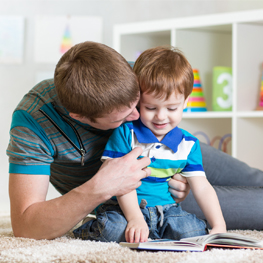
It’s back-to-school time! Often, as parents, we are pleased to settle into familiar routines and see our child back in the classroom ready to learn with the care and support of their new teacher. We may wonder about our role at home: How do we, as parents or caregivers, complement our child’s learning in school?
Reading is the most important skill your child will learn
Learning to read - becoming literate - is essential for anyone to live a productive life. First your child learns to read, and then they will read to learn. Ideally, by the end of first grade, children can read simple sentences and stories. By third grade, they are expected to read almost any kind of text. They can likely ‘sound out’ (phonetically decode) regularly spelled words, and must also master reading common sight words.
It starts before school: Read, sing, talk, play... and love
The 2,000 days between conception and kindergarten-age are a time of rapid brain development, setting the tone for a lifetime of reading, thinking and learning. Reading, singing, talking, playing and loving your child are the building blocks to literacy for newborns through to children heading to Kindergarten.
Read aloud at every age
One of the simplest and most important things you can do is to read aloud to your child for at least 15 minutes every day! Even after they can read to you, take the time to read to them too from books, magazines, recipes or newspapers. Reading to your child above their reading level introduces them to new ideas and vocabulary. Later, when they encounter a new word, they will be more able to read and understand it.
Play sight word games, use flash cards and have fun with writing activities
If your child is in Kindergarten to Grade 3, their teacher likely uses The Dolch word list (or sight words) in classroom instruction. The list has 220 ‘service words’ that must be quickly recognized in order to achieve reading fluency. The list, which is divided into grade levels, includes the most frequently-used words in the English language. Sight words make up 50 to 70 per cent of any general text.
Many of the 220 Dolch words cannot be ‘sounded’out, so they have to be learned by sight; meaning, they need to be memorized. If your child finds reading difficult, it may be that games, flash cards and activities at home can help build skill and confidence. Our Calgary Reads’trained volunteer tutors use the Dolch sight words, too, as part of the important work they do in schools with struggling readers. Repetition and practice will help your child build recognition and once the core basic sight words are memorized, your child will read with more fluency and greater comprehension.
Ways to help your child with reading
Be a role model - read yourself and read often to your child!
Provide a variety of reading materials - some for enjoyment and some with information about hobbies and interests.
Encourage activities that require reading; for example, cooking (reading a recipe), constructing a kite (reading directions) or identifying an interesting bird’s nest (using a reference book).
Establish a reading time for at least 15 minutes each day.
Write notes to your school-age child; ask them to write back.
Ask your child to bring a library book home to read to a younger sibling.
Establish cozy reading places in your home and outside (weather permitting); somewhere quiet with a comfy place to sit or lie. Provide lots of books and a lamp or flashlight.
Use flash cards and games to help build your child’s memory of sight words and expand their vocabulary. For Dolch word lists by grade level, visit k12reader.com/dolch-word-list
Calgary Reads build connections, strengthen networks, champion, involve and innovate because we all have a role to play in creating a thriving community where all children can read with confidence and joy! Visit the website, calgaryreads.com, for videos and resources to help you build the joy of reading in your child.
Calgary’s Child Magazine © 2024 Calgary’s Child